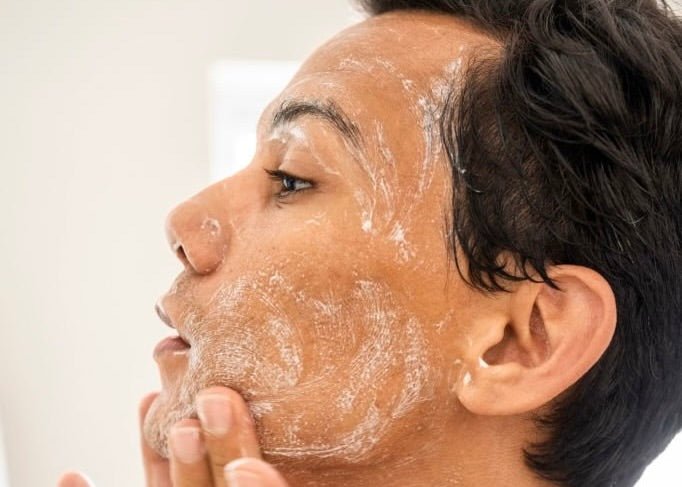
Does Hyaluronic Acid Exfoliate? Clarifying Its Skin Care Role
Hyaluronic acid has become a buzzword in the skincare industry. It's found in a multitude of products, from serums to moisturizers, and is often hailed as a miracle ingredient for skin hydration. But does hyaluronic acid exfoliate? Let's get into the science behind this popular skincare ingredient and clarify its role in skin health.
Understanding Hyaluronic Acid
What is Hyaluronic Acid?
Hyaluronic acid (HA) is a naturally occurring substance in our skin that works to keep it hydrated and plump. It's a type of sugar molecule that can hold up to 1000 times its weight in water, making it an excellent moisturizer. As we age, our natural production of HA decreases, which can lead to dryness and the formation of wrinkles.
Fortunately, we can replenish our skin's hyaluronic acid levels through topical application. It's a key ingredient in many skincare products due to its ability to attract and retain moisture, promoting a youthful, dewy complexion.
The Benefits of Hyaluronic Acid
There are numerous benefits to incorporating hyaluronic acid into your skincare routine. Here are a few:
- Hydration: As mentioned earlier, HA is a powerful humectant that can hold a significant amount of water, providing intense hydration to the skin.
- Anti-Aging: By keeping the skin hydrated, HA helps to maintain skin elasticity and reduce the appearance of fine lines and wrinkles.
- Skin Repair: HA aids in skin repair by promoting skin cell regeneration and providing a protective barrier against environmental damage.
Moreover, since hyaluronic acid is naturally produced by our bodies, it's generally well-tolerated by all skin types, including sensitive and acne-prone skin.
Hyaluronic Acid and Exfoliation
Does Hyaluronic Acid Exfoliate?
Contrary to some misconceptions, hyaluronic acid does not exfoliate the skin. Exfoliation involves the removal of dead skin cells from the skin's surface, either through physical means (like a scrub) or chemical means (like alpha or beta hydroxy acids). Hyaluronic acid, on the other hand, is a hydrating ingredient that works to improve skin moisture levels and smoothness, but it does not have exfoliating properties.
However, this doesn't mean that HA doesn't play a role in the exfoliation process. In fact, it can be a crucial component in a skincare routine that includes exfoliation.
The Role of Hyaluronic Acid in an Exfoliating Routine
While hyaluronic acid doesn't exfoliate, it can help soothe and hydrate the skin after exfoliation. Exfoliating can sometimes leave the skin feeling dry and sensitive, and this is where HA comes in. By replenishing the skin's moisture levels, it can help counteract the potentially drying effects of exfoliation, leaving your skin feeling soft, smooth, and hydrated.
It's also worth noting that well-hydrated skin can better absorb other skincare ingredients, so using a product with hyaluronic acid after exfoliating can enhance the effectiveness of the rest of your skincare routine.
How to Incorporate Hyaluronic Acid into Your Skincare Routine
Choosing the Right Product
When it comes to choosing a hyaluronic acid product, you have several options. HA is commonly found in serums, moisturizers, and masks. Serums are a popular choice as they are highly concentrated and penetrate deeper into the skin. However, moisturizers and masks with HA can also provide significant hydration benefits.
When selecting a product, look for one that lists hyaluronic acid high up in the ingredient list to ensure it contains a sufficient amount. Also, consider opting for products that contain sustainably sourced HA to support environmental sustainability.
Application Tips
For best results, follow these steps to incorporate hyaluronic acid into your skincare routine:
- Cleanse your skin to remove any dirt or makeup.
- If you're using an exfoliant, apply it after cleansing. Remember to follow the product's instructions regarding frequency of use to avoid over-exfoliation.
- Apply your hyaluronic acid product. If you're using a serum, apply a few drops and gently pat it into your skin.
- Follow up with a moisturizer to seal in the hydration.
- Always finish with a broad-spectrum sunscreen during the day to protect your skin from UV damage.
Remember, everyone's skin is different, so it may take some trial and error to find the right product and routine for you. However, with its hydrating and skin-smoothing benefits, hyaluronic acid is a worthy addition to most skincare routines.
Conclusion
In conclusion, while hyaluronic acid does not exfoliate the skin, it plays a vital role in maintaining skin hydration and health. Its ability to soothe and hydrate makes it an excellent companion to exfoliating products, helping to keep your skin balanced and radiant. So, while it may not scrub away dead skin cells, its contribution to your skin's overall wellbeing is undeniable.
Remember to choose products that are sustainably sourced and suitable for your skin type. With the right routine, you can enjoy the many benefits of hyaluronic acid and achieve a healthy, youthful complexion.














